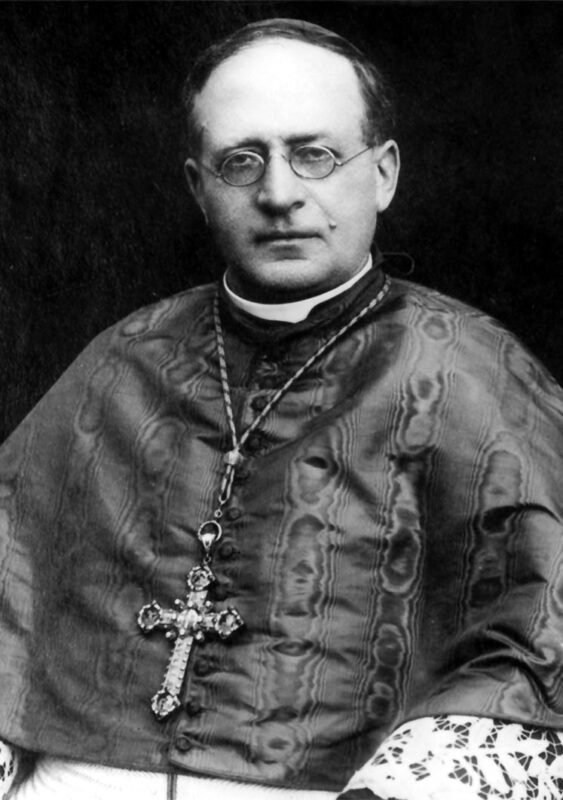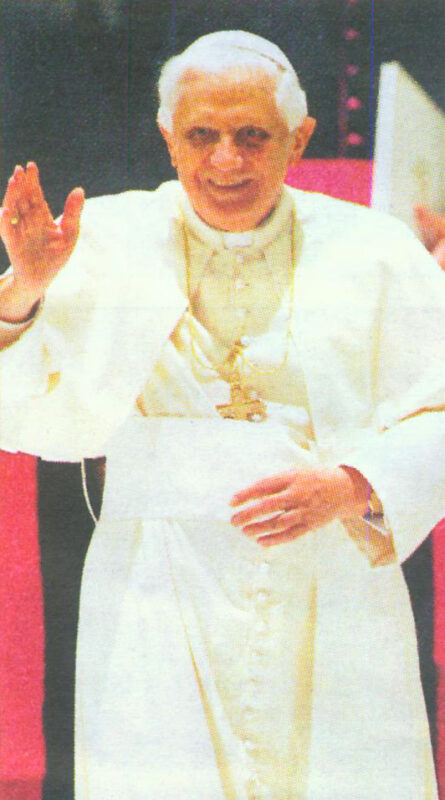
China Bridge (神州橋樑)_2007/Sep
The papal letter to China in long-term perspective
In 1950, there was a conference in Beijing to promote the use of the national language throughout “New China”, in the schools, on the radio, and in the cinemas. That was in the days before television. At the end of the meeting, Chairman Mao said, “Okay, we will promote Putonghua, but you have to realise that it will be a rather long time before everyone in this country speaks it at home.” Someone asked, “Mr. Chairman, what do you mean by ‘a rather long time’?” Mao paused before replying, “About 500 years.”
By contrast, western political leaders usually think about the next election. Five years ahead is a rather long time, while ten years hence is beyond their horizon.
Stock markets throughout the world look to the next quarter, or at most six months ahead. As more people in China buy stocks, and as everyone watches 15-second television commercials with jumping images, will Chinese culture change? Will people lose the ability to contemplate the long-term?
2007 is not 1937


On June 29, the long-awaited letter of Pope Benedict XVI t the Catholics of China was released. One day earlier, a Catholic in the United States of America (USA) e-mailed a priest in Hong Kong regarding an earlier papal document.
“Dear Father X: We have 2000 copies of Divini Redemptoris, On Atheistic Communism, an encyclical by Pius XI. Could you distribute these pamphlets in the churches in Hong Kong? Please pay postage. Thanks!”
The priest muttered, “Doesn’t he know that 2007 is not 1937?” and deleted the email. He acted too quickly. On second thought, he could have replied:
“Dear Mr. Y: Divini Redemptoris is an important historical document. It reflects an era of severe persecution. After the October Revolution in 1917, churches, mosques, synagogues and Buddhist temples across the new Soviet Union were closed, their wealth confiscated, and their religious leaders sent to labor camp or shot. During the Spanish Civil War, when Pope Pius XI wrote his encyclical, the process was being repeated in Catholic Spain. In those years, there was no hope of cooperation or mutual understanding. We need to remember history. A Church without a sense of history is like a forgetful old person. We cannot forget the sufferings of those who went before us.
However, 2007 is not 1937. Christians and communists in Europe started moving From Anathema To Dialogue, as Roger Garaudy wrote in his book by that title, published in 1965. China in 2007 is not the China of 1957, 1967, or 1977. Although the situation leaves much to be desired, the Catholic Church has returned from the dead.
Our Holy Father has just published a letter to all the Catholics in China, not just to the unofficial Church, but also to the entire Church. While paying close attention to Catholic doctrine, the letter is pastoral and conciliatory. The Vatican has no intention of overthrowing the government of the People’s Republic of China. However, the Holy Father does want to defend the just rights of the Church. It is possible to be both a good Catholic and a good citizen of China.
Mr. Y., have you ever visited mainland China, Hong Kong, Macau or Taiwan? You might be surprised to see the situation on the ground with your own eyes and to listen carefully with your own ears, or through an interpreter. By all means continue to pray for the entire Chinese nation, not just for the one per cent who are Catholics.
We need your prayers. But before you talk to your friends in the USA about China, please update your knowledge of our situation. Please read the new letter of Pope Benedict XVI carefully.”
The big picture as seen by Vatican II
The Second Vatican Council ended by issuing four of its 16 documents on 7 December 1965. The longest closing paper was Gaudium et Spes (The Pastoral Constitution on the Church in the Modern World). Numbers 37-39 take a long-term view and present an overview of our situation before God.
Sin has infected history
Gaudium et Spes, n. 37, is blunt: sin has infected human activity since the beginning. Yes, there has been progress, but every period of history records individual and group selfishness. On the battlefield of the world, people have to struggle, but with God’s grace, we can act with integrity. The Church cannot be conformed to this world (cf. Rom. 12.2).
People inside the Church are not immune to error and sin. On 24 October 2001, Pope John Paul II sent a message to a conference that was discussing the 400th anniversary of the arrival of Father Matteo Ricci in Beijing. The Holy Father’s letter made news by admitting that “the work of members of the Church in China was not always without error, the bitter fruit of their personal limitations and of the limits of their actions.” He asked pardon for those mistakes. What the pope said about the Catholic Church, that she “must not be afraid of historical truth and she is ready – with deeply felt pain – to admit the responsibility of her children,” is worth imitating by other institutions and nations. It is hard in any culture to apologize publicly, but such painful steps are necessary to heal old wounds and to move into the future without dragging the dead weight of the past forever.
When Vatican II ended, no one foresaw the Cultural Revolution erupting in China the following summer. The violent activity of those ten lost years, 1966-1976, was clearly infected by sin. For Christians, that point about human history did not need any further proof, although it came as a big shock and disillusionment to many communists.
The Paschal Mystery
Gaudium et Spes, n. 38, declares that human activity finds its fulfillment in the Paschal Mystery. This teaching comes directly from the New Testament. The Word Made Flesh died for sinners. But the cross was followed by the glory of the resurrection. With the sending of the Holy Spirit, people are free to love one another, while the Body and Blood of Christ nourishes the Church on its journey to the heavenly banquet.
But in the words of the old communist anthem of 1871, The International, “Away with all your superstitions…No saviour from on high delivers.” Human fulfillment and salvation have to come in this world through human struggle. Religion was viewed as the “opium of the people.” Yet China today is struggling to create a stable, prosperous and harmonious society. Various religions have a constructive role to play. Believers now get credit in the official media for being law-abiding, productive, and patriotic citizens.
Looking to the future
Gaudium et Spes, n. 39, states that the Church is in the dark about future. “We know neither the moment of the consummation of the earth and of humankind nor the way the universe will be transformed.” Many fundamentalist preachers have their prophecy-by-prophecy description of the end times, plus a detailed timetable, which has to be revised every few years. However, Catholics do not take an official stand on the timing of the Second Coming, not even to the nearest century. In his letter, Pope Benedict XVI makes one reference to the Book of Revelation. John wept because no one was found worthy to open the scroll sealed with seven seals. (Rev. 5.4) The Holy Father reflects, “History remains indecipherable, incomprehensible.” With the coming of the Lamb of God, the situation changes and there is hope.
Gaudium et Spes, n. 39, firmly tells us that God will create a new heaven and a new earth, raise the dead, and free all of creation from its bondage to decay. “Far from diminishing our concern to develop this earth, the expectancy of a new earth should spur us on.” The Council Fathers were urging us not to look up into the sky and passively wait for Jesus to return. The kingdom of God is not to be mistaken for an earthly kingdom, but we still have a duty to work for a more just, holy, loving and peaceful world.
In China, the old revolutionary fervor has been set aside for economic growth and technological progress. Greed, corruption and environmental pollution are destructive by-products of the race to get rich quickly. In his letter, our pope sees social and economic development as “desired and necessary,” but it has brought a “tendency towards materialism and hedonism, which are spreading from the big cities to the entire country.” Chinese Catholics see more to life than money and pleasure, so they can contribute to making China better.
The pope does not need a crystal ball
What will the future bring? During Vatican II, people around the world had good reason to fear a nuclear holocaust. Yet the overall outlook of Gaudium et Spes is surprisingly optimistic.
Four decades later, the human race is still here. We are anxious about a long list of nightmares, including global warming, running out of oil and terrorism. From the pope’s letter, one can compile a long list of obstacles to the free development of the Catholic Church in China. Yet the Holy Father is willing “to engage in respectful and constructive dialogue.”
No one has a crystal ball. Will the Vatican and China establish diplomatic relations in 2008, or not until 2080? God knows! The Holy Father quotes the challenge of Jesus:
“Set out into the deep!” (Lk. 5:4) “These words…invite us to remember the past with gratitude, to live the present with enthusiasm and to look forward to the future with confidence…In China too, the Church is called to be a witness of Christ, to look forward with hope, and – in proclaiming the Gospel – to measure up to the new challenges that the Chinese people must face.”
We are grateful for the letter from Pope Benedict XVI.
MJS


 ENG
ENG